Search Results for Bioethics
To browse more topics, click a topic below or try our advanced search.
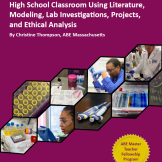 Resource (Teaching Materials, Lab-based)
Resource (Teaching Materials, Lab-based)Exploring CRISPR-Cas9 in the High School Classroom Using Literature, Modeling, Lab Investigations, Projects, and Ethical Analysis

This unit, developed by ABE Massachusetts Master Teacher Fellow Christine Thompson, introduces students to CRISPR-Cas9 gene-editing technology through a combination of literature, modeling,… Read more
Class Sessions9–15
Appropriate AgesUpper Secondary, Advanced
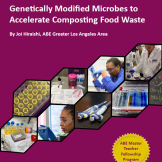 Resource (Teaching Materials, Lab-based)
Resource (Teaching Materials, Lab-based)Genetically Modified Microbes to Accelerate Composting Food Waste

In this unit, developed by ABE Greater Los Angeles Master Teacher Fellow Joi Haraishi, students investigate how microbes are harnessed in modern waste management systems and connect that knowledge to… Read more
Class Sessions20
Appropriate AgesLower Secondary, Upper Secondary
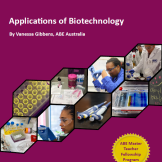 Resource (Teaching Materials, Lab-based)
Resource (Teaching Materials, Lab-based)Applications of Biotechnology

In this engaging unit, developed by ABE Australia Master Teacher Fellow Vanessa Gibbens, students explore real-world applications of biotechnology. Through hands-on use of biotechnology techniques… Read more
Class Sessions15–20
Appropriate AgesUpper Secondary
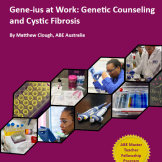 Resource (Teaching Materials, Lab-based)
Resource (Teaching Materials, Lab-based)Gene-ius at Work: Genetic Counseling and Cystic Fibrosis

In this unit, developed by ABE Australia Master Teacher Fellow Matthew Clough, students step into the role of genetic counselors to explore the inheritance and ethical implications of genetic… Read more
Class Sessions10
Appropriate AgesUpper Secondary, Introductory, Advanced
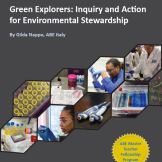 Resource (Teaching Materials, Classroom-based)
Resource (Teaching Materials, Classroom-based)Green Explorers: Inquiry and Action for Environmental Stewardship

This project, developed by ABE Italy Master Teacher Fellow Gilda Nappo, covers climate change, specifically the implications of various kinds of pollution. Read more
Class Sessions10–20Appropriate AgesUpper Secondary
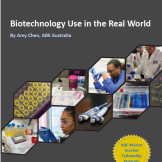 Resource (Teaching Materials, Classroom-based)
Resource (Teaching Materials, Classroom-based)Biotechnology Use in the Real World

In this project, developed by ABE Australia Master Teacher Fellow Amy Chen, students become familiar with the many ways that biotechnology is in the world around us, and how it impacts our lives, and… Read more
Class Sessions18
Appropriate AgesUpper Secondary
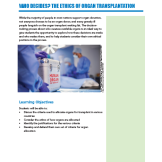 Resource (Teaching Materials, Classroom-based, Pocket Lesson)
Resource (Teaching Materials, Classroom-based, Pocket Lesson)Who Decides? The Ethics of Organ Transplantation

In this pocket lesson, students learn about the process adopted in various areas of the world to decide who receives available organs. This content gives students the opportunity to explore how these… Read more
Class Sessions3Appropriate AgesUpper Secondary, Introductory
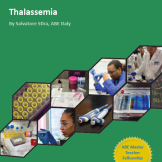 Resource (Teaching Materials, Classroom-based)
Resource (Teaching Materials, Classroom-based)Thalassemia

In this lesson, students deepen their understanding of the relationship between scientific research in modern biology and medicine by studying the genetic basis of thalassemia, a form of hereditary… Read more
Class Sessions15Appropriate AgesUpper Secondary
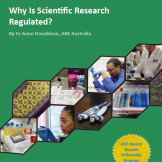 Resource (Teaching Materials, Classroom-based)
Resource (Teaching Materials, Classroom-based)Why Is Scientific Research Regulated?

This lesson covers scientific regulation and an overview of bioethics, as well as nuclear energy, gene editing, and a number of other hot-button issues that students will definitely have heard about… Read more
Class Sessions10Appropriate AgesUpper Secondary
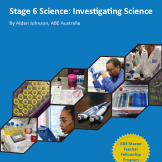 Resource (Teaching Materials, Classroom-based)
Resource (Teaching Materials, Classroom-based)Stage 6 Science: Investigating Science

In this lesson, students explore ethical and social perspectives, model X-ray crystallography, and explore the science through LabXchange to assess the impacts these technologies and scientific… Read more
Class Sessions25Appropriate AgesUpper Secondary
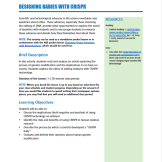 Resource (Teaching Materials, Classroom-based, Pocket Lesson)
Resource (Teaching Materials, Classroom-based, Pocket Lesson)Designing Babies with CRISPR

In this pocket lesson, students read and analyze an article exploring the process of genetic modification and the implications it can have on society. Students explore the ethics of editing embryos… Read more
Class Sessions2–3Appropriate AgesUpper Secondary, Advanced
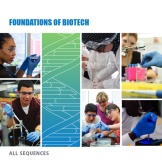 Resource (Teaching Materials, Lab-based)
Resource (Teaching Materials, Lab-based)Foundations of Biotech

The Foundations of Biotech labs were created to introduce students to biotech techniques and concepts; in these labs, students explore recombinant DNA technology.Sequences of these labs were designed… Read more
Class Sessions4–20
Appropriate AgesUpper Secondary, Advanced
 Resource (Teaching Materials, Lab-based)
Resource (Teaching Materials, Lab-based)Exploring CRISPR-Cas9 in the High School Classroom Using Literature, Modeling, Lab Investigations, Projects, and Ethical Analysis

This unit, developed by ABE Massachusetts Master Teacher Fellow Christine Thompson, introduces students to CRISPR-Cas9 gene-editing technology through a combination of literature, modeling,… Read more
Class Sessions9–15
Appropriate AgesUpper Secondary, Advanced
 Resource (Teaching Materials, Lab-based)
Resource (Teaching Materials, Lab-based)Genetically Modified Microbes to Accelerate Composting Food Waste

In this unit, developed by ABE Greater Los Angeles Master Teacher Fellow Joi Haraishi, students investigate how microbes are harnessed in modern waste management systems and connect that knowledge to… Read more
Class Sessions20
Appropriate AgesLower Secondary, Upper Secondary
 Resource (Teaching Materials, Lab-based)
Resource (Teaching Materials, Lab-based)Applications of Biotechnology

In this engaging unit, developed by ABE Australia Master Teacher Fellow Vanessa Gibbens, students explore real-world applications of biotechnology. Through hands-on use of biotechnology techniques… Read more
Class Sessions15–20
Appropriate AgesUpper Secondary
 Resource (Teaching Materials, Lab-based)
Resource (Teaching Materials, Lab-based)Gene-ius at Work: Genetic Counseling and Cystic Fibrosis

In this unit, developed by ABE Australia Master Teacher Fellow Matthew Clough, students step into the role of genetic counselors to explore the inheritance and ethical implications of genetic… Read more
Class Sessions10
Appropriate AgesUpper Secondary, Introductory, Advanced
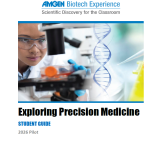 Resource (Lab-based)
Resource (Lab-based)Exploring Precision Medicine

The versions available here are preliminary and will be formatted once we receive and integrate teacher feedback. Updated versions should be available before the 2026–27 school year begins.For… Read more
Class Sessions11–15
Appropriate AgesUpper Secondary, Advanced
 Resource (Teaching Materials, Lab-based)
Resource (Teaching Materials, Lab-based)Foundations of Biotech

The Foundations of Biotech labs were created to introduce students to biotech techniques and concepts; in these labs, students explore recombinant DNA technology.Sequences of these labs were designed… Read more
Class Sessions4–20
Appropriate AgesUpper Secondary, Advanced
 Resource (Teaching Materials, Classroom-based)
Resource (Teaching Materials, Classroom-based)Green Explorers: Inquiry and Action for Environmental Stewardship

This project, developed by ABE Italy Master Teacher Fellow Gilda Nappo, covers climate change, specifically the implications of various kinds of pollution. Read more
Class Sessions10–20Appropriate AgesUpper Secondary
 Resource (Teaching Materials, Classroom-based)
Resource (Teaching Materials, Classroom-based)Biotechnology Use in the Real World

In this project, developed by ABE Australia Master Teacher Fellow Amy Chen, students become familiar with the many ways that biotechnology is in the world around us, and how it impacts our lives, and… Read more
Class Sessions18
Appropriate AgesUpper Secondary
 Resource (Teaching Materials, Classroom-based, Pocket Lesson)
Resource (Teaching Materials, Classroom-based, Pocket Lesson)Who Decides? The Ethics of Organ Transplantation

In this pocket lesson, students learn about the process adopted in various areas of the world to decide who receives available organs. This content gives students the opportunity to explore how these… Read more
Class Sessions3Appropriate AgesUpper Secondary, Introductory
 Resource (Teaching Materials, Classroom-based)
Resource (Teaching Materials, Classroom-based)Thalassemia

In this lesson, students deepen their understanding of the relationship between scientific research in modern biology and medicine by studying the genetic basis of thalassemia, a form of hereditary… Read more
Class Sessions15Appropriate AgesUpper Secondary
 Resource (Teaching Materials, Classroom-based)
Resource (Teaching Materials, Classroom-based)Why Is Scientific Research Regulated?

This lesson covers scientific regulation and an overview of bioethics, as well as nuclear energy, gene editing, and a number of other hot-button issues that students will definitely have heard about… Read more
Class Sessions10Appropriate AgesUpper Secondary
 Resource (Teaching Materials, Classroom-based)
Resource (Teaching Materials, Classroom-based)Stage 6 Science: Investigating Science

In this lesson, students explore ethical and social perspectives, model X-ray crystallography, and explore the science through LabXchange to assess the impacts these technologies and scientific… Read more
Class Sessions25Appropriate AgesUpper Secondary
 Resource (Teaching Materials, Classroom-based, Pocket Lesson)
Resource (Teaching Materials, Classroom-based, Pocket Lesson)Designing Babies with CRISPR

In this pocket lesson, students read and analyze an article exploring the process of genetic modification and the implications it can have on society. Students explore the ethics of editing embryos… Read more
Class Sessions2–3Appropriate AgesUpper Secondary, Advanced
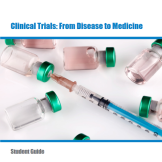 Resource (Classroom-based)
Resource (Classroom-based)Clinical Trials: From Disease to Medicine

In the From Disease to Medicine module, students learn about the purpose and structure of clinical research by exploring the various phases of a clinical trial. Students investigate the… Read more
Class Sessions8–10
Appropriate AgesUpper Secondary, Advanced
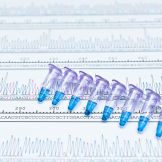 Resource (Classroom-based, Pocket Lesson)
Resource (Classroom-based, Pocket Lesson)Changing Organ Donation with Biotechnology

In this pocket lesson, students explore the need for innovative solutions to the shortage of transplantable organs and how gene editing technologies might offer a potential solution. Read more
Class Sessions2-3Appropriate AgesUpper Secondary, Advanced
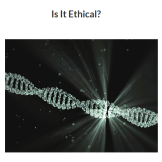 Resource (Web-based)
Resource (Web-based)Bioethics of Gene Editing

Lyme disease is a pervasive problem in the United States. Kevin Esvelt, a scientist at MIT, is trying to use gene editing to disrupt the cycle of transmission. In this module, students learn about… Read more
Appropriate AgesUpper Secondary, Advanced
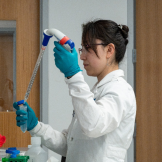 Blog Post
Blog PostA Redesigned Precision Medicine Module Sparks Student Excitement

Excitement is in the air in a biology classroom in Tampa, Florida. As Mishell Thomas-King explains how her students will be trying out a new lab next quarter that lets them test their own DNA, a… Read more
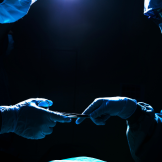 Blog Post
Blog PostEthical Questions Around Transplanted Organ Distribution

Worldwide, over 100,000 people receive life-saving organ transplants every year. Unfortunately, many people still die while awaiting transplant. In the United States, 17 people awaiting transplant… Read more
 Blog Post
Blog PostPersonal Reflections on a Professional Learning Course

It’s not often that one finishes a professional learning course fully satisfied, with the awareness of having spent one’s time well. Today that happened. The course “The new frontiers of… Read more
 Blog Post
Blog PostCreating Community-Driven Genomic Data for Native Peoples

While pursuing a PhD in cancer biology, Krystal Tsosie had a stark realization: that the therapeutics she might ultimately develop may not in the end benefit her community, the Navajo Nation. “I… Read more
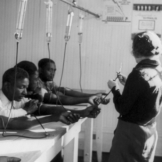 Blog Post
Blog PostBreaking Historic Cycles of Mistrust in Medicine

The COVID-19 pandemic has given us new awareness of a variety of social and health factors that make certain groups more vulnerable to disease and more responsive to treatments. Differences such as… Read more
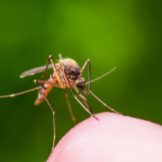 Blog Post
Blog PostConsidering the Ethics of Editing Genes (Part 2)

In Part 1 of this series, we explored the ethics of gene editing in the context of editing plant and animal genomes for agricultural purposes. In this part, we explore two more controversial uses… Read more
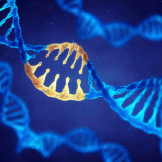 Blog Post
Blog PostConsidering the Ethics of Editing Genes (Part 1)

In this first part of a two-part blog series, we explore the history and ethics of editing plant and animal genes in the context of agriculture and offer suggestions for incorporating the ethics of… Read more
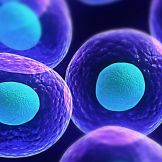 Blog Post
Blog PostBioinformatics Resources from ABE

Technology has brought about some radical changes in the ways in which science is practiced. What first seemed nearly impossible—sequencing the entire human genome—is now a reality, and what first… Read more
 Resource (Teaching Materials, Classroom-based, Pocket Lesson)
Resource (Teaching Materials, Classroom-based, Pocket Lesson)Who Decides? The Ethics of Organ Transplantation

In this pocket lesson, students learn about the process adopted in various areas of the world to decide who receives available organs. This content gives students the opportunity to explore how these… Read more
Class Sessions3Appropriate AgesUpper Secondary, Introductory
 Resource (Teaching Materials, Classroom-based, Pocket Lesson)
Resource (Teaching Materials, Classroom-based, Pocket Lesson)Designing Babies with CRISPR

In this pocket lesson, students read and analyze an article exploring the process of genetic modification and the implications it can have on society. Students explore the ethics of editing embryos… Read more
Class Sessions2–3Appropriate AgesUpper Secondary, Advanced
 Resource (Classroom-based, Pocket Lesson)
Resource (Classroom-based, Pocket Lesson)Changing Organ Donation with Biotechnology

In this pocket lesson, students explore the need for innovative solutions to the shortage of transplantable organs and how gene editing technologies might offer a potential solution. Read more
Class Sessions2-3Appropriate AgesUpper Secondary, Advanced